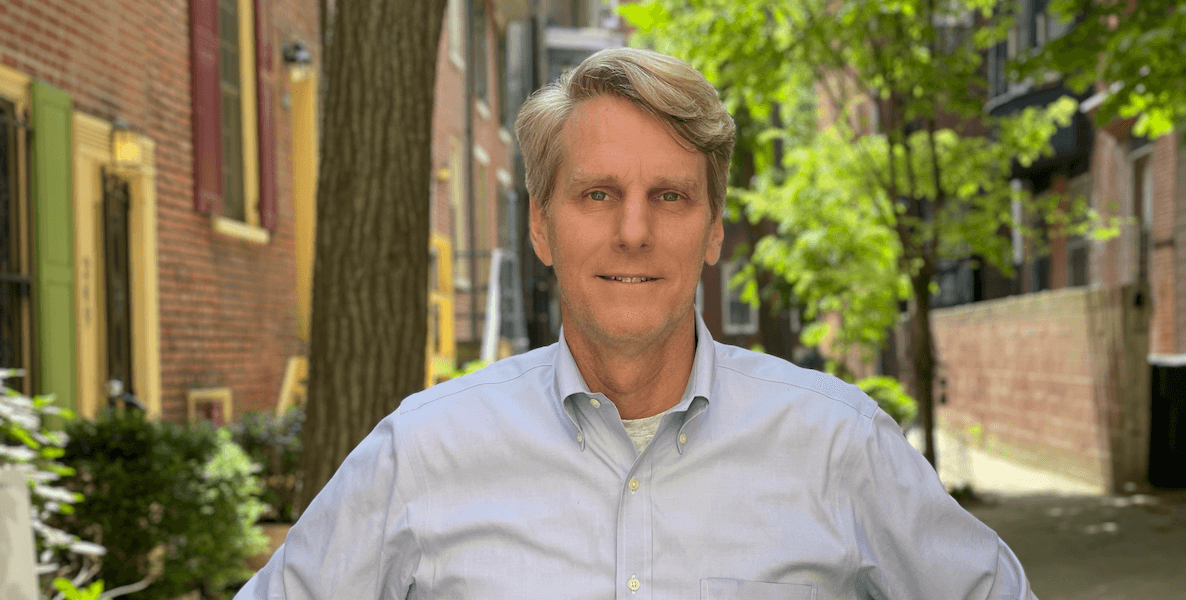The last time anyone in city government had a big idea for Philadelphia Gas Works — one of the last utilities owned by a city in the country — was in 2014, when then-Mayor Michael Nutter negotiated a deal with Connecticut-based UIL to buy the company for $1.8 billion.
That deal fell through after City Council President Darrell Clarke refused to hold a hearing on it, and UIL — tired of waiting for action — withdrew its offer. Since then, no one has attempted to solve the conundrum of PGW, which has among the highest rates in the country, and whose operation would seem to run counter to Philly’s environmental goals.
That could change if John B. Kelly III wins a seat as a City Councilmember at-large. A Democrat running in this month’s primary, Kelly’s singular idea is a plan to leverage PGW’s existing assets, plus federal grants, tax credits, municipal buying power, and other municipal funding tools to accelerate a transition to green energy technologies.
“To position Philadelphia as a leader in green energy, the first movement advantage is critical,” his plan reads. “There’ll be forces exerted on PGW whether they want it or not that they need to deal with.”
A political dynasty
With his candidacy, Kelly is following in his family’s political footsteps: His grandfather was the city’s Democratic Party chairman and a 1935 mayoral candidate. His father served on City Council from 1968 to 1976.
The Kellys, who settled into East Falls three generations ago, were bricklayers, Olympic rowers — including his father, John B. Kelly, Jr., after whom the Drive is named — and, in one case, a movie star-turned-Princess of Monaco — John B. Kelly III’s aunt, Grace. And then, the local politics: “My grandfather was the one who built the Democratic Party to what it became when Clark and Dilworth became mayors.” he says.
But Kelly, age 62, didn’t right away follow in his family’s footsteps toward politics (or Hollywood). He wanted to build his own experience first, he says. Kelly left home to study economics and government at Harvard University, returned to Northwest Philadelphia to raise his two children, and joined the world of municipal finance. (He’s lived in Center City for the past 10 years.)
“To position Philadelphia as a leader in green energy, the first movement advantage is critical,” his plan reads. “There’ll be forces exerted on PGW whether they want it or not that they need to deal with.”
Kelly spent 20 years advising on the finances of cities and counties across the country for PNC Capital Markets, Public Financial Management (PFM), a national leader in municipal finance issues, and Janney Montgomery Scott. Later, he became a turnaround manager for Philadelphia manufacturing companies. For four years during the early 1990s, Kelly helped grow the revenue of Boathouse Sports, a North Philadelphia clothing manufacturer, from $1 to $4 million, he says.
Currently, Kelly is CFO of Vitara Biomedical Inc., a West Philly medical device company that is developing an extra-uterine environment to improve neonatal care for premature infants.
He was also founding treasurer for the Philadelphia Police Foundation, which brings private resources to fund department-wide projects, such as obtaining a new generation of bulletproof vests and a crime mapping computer program.
Kelly decided to run for Council this year because he feels vacancies offer opportunity to make the changes he’d like to see. Like every other candidate, he cites crime — primarily gun violence and “mob attacks” that he describes as “frightening” — City services, Covid recovery, educational funding and underinvestment in poorer neighborhoods as challenges he wants to tackle.
Decarbonizing our energy future
What distinguishes Kelly from others running for City Council is his focus on the environment. He has long been active in pro-environment causes, not the least of which is serving as U.S. chapter president of his cousin’s Prince Albert II of Monaco Foundation-USA since 2008. Kelly says if elected to Council, he will combine his professional work in municipal finance and volunteer work in environmental areas to be a voice for cleaner, safer, and more productive energy solutions for the city.
His “Greener City” plan would leverage PGW’s existing assets, plus federal grants, tax credits, municipal buying power, and other municipal funding tools to accelerate a transition to green energy technologies.
PGW, the country’s largest municipally-owned utility, contributes almost one fifth of Philly’s carbon emissions. Still entirely reliant on natural gas, including problematic liquified natural gas, and fossil fuels, the utility employs 1,600 — and currently holds $1 billion in debt. Kelly regards PGW as teetering on obsolescence, putting all of Philadelphia at risk for economic disaster.
John B. Kelly III plans to be the Councilmember who works with PGW to ensure that the promised restructuring benefits those most affected — the residents of Philadelphia.
Richard G. Barnes, a PGW spokesman, says that the utility is already in the planning stages of restructuring. “As we speak, PGW is leading our region’s energy evolution by working not only on LNG (liquified natural gas) and CHP (combined heat and power), but also on several new technologies, including geothermal, hydrogen and renewable natural gas,” he says. “With all these technologies, our existing distribution system gives the city an invaluable and irreplaceable advantage and benefit.”
If Kelly is elected, he plans to be the Councilmember who works with PGW to ensure that the promised restructuring benefits those most affected — the residents of Philadelphia.
“If we think ahead, we can turn that risk into an opportunity,” he says. “We need someone in Council who is forward looking, looking to solve these kinds of problems.”
Kelly wants to start by implementing feasibility studies to explore the following green energy possibilities to replace natural gas and fossil fuel:
- Buy excess hydrogen from New Jersey and Delaware’s offshore wind producers.
- Capitalize on our region’s excess nighttime nuclear capacity.
- Use sludge. Some of the Philadelphia Water Department sewage gets converted into waterway-polluting fertilizer. Leftover sewage sludge and food waste from restaurants and other food operations gets dumped into methane-producing landfills. Kelly wants to convert both into renewable biogas, “a direct replacement for fossil fuel-based gas,” says the plan. “Instead of paying Texas for our natural gas, we could keep the money and jobs here.”
- Use current hydrogen capacity and future carbon capture to “make synthetic gas — known as syngas — for distribution via PGW.”
While the City can oversee changes to the utility it owns, Kelly does not believe it’s appropriate for the City to dictate green energy policy to businesses or residents. He wants to leave ideas like carbon taxes to higher authorities. Nonetheless, change is coming — to all of us, which will only further impact PGW.
“If people start shifting away from gas, then PGW ends up defaulting on its bonds,” he says. It ends up not being able to support the remaining people in the system, because there’s not enough payers to pay for the maintenance of the system.”
His platform — half environmental, half business — seems, somehow, signature Kelly family. Says the plan, “Philadelphia has the resources — skilled labor, existing infrastructure, and market position — to take advantage of the opportunities to be a major player in the green energy economy of the 21st century.”
The Citizen is writing about Philadelphia City Council candidates who are doing what for a long time was the unthinkable: Bucking the system by running for office with ideas and experience — not just by dint of being the usual suspects. Because if there’s one thing we need more of, it’s this: More people paying more attention to our local politics, running for office, offering solutions and prepping to bring about much-needed change.
 Lead support for Every Voice, Every Vote is provided by the William Penn Foundation, with additional funding from The Lenfest Institute, Peter and Judy Leone, the John S. and James L. Knight Foundation, Harriet and Larry Weiss, and the Wyncote Foundation, among others.
Lead support for Every Voice, Every Vote is provided by the William Penn Foundation, with additional funding from The Lenfest Institute, Peter and Judy Leone, the John S. and James L. Knight Foundation, Harriet and Larry Weiss, and the Wyncote Foundation, among others.
![]()
MORE ON THE 2023 ELECTION FROM THE PHILADELPHIA CITIZEN
Courtesy of John B. Kelly III



